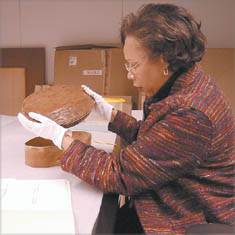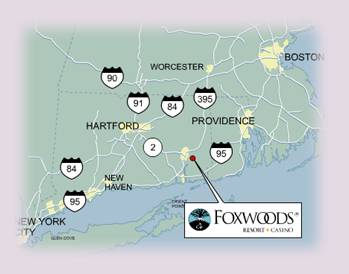|
|
Canku Ota |
|
|
(Many Paths) |
||
|
An Online Newsletter Celebrating Native America |
||
|
April 6, 2002 - Issue 58 |
||
|
|
||
|
Cashing In On An Education |
||
|
by Karen Florin The
Day
|
||
|
credits:Tim
Martin/The Day
Kim Peters, collections manager/registrar assistant at the Mashantucket Pequot Museum & Research Center, inspects an artifact. |
 Mashantucket
— Kimberly A. Peters spends her days taking care of artifacts at
the Mashantucket Pequot Museum & Research Center. She spent one recent
morning photographing necklaces made of wampum — the shells and beads
the tribe once used in trade — and then updating the museum's database. Mashantucket
— Kimberly A. Peters spends her days taking care of artifacts at
the Mashantucket Pequot Museum & Research Center. She spent one recent
morning photographing necklaces made of wampum — the shells and beads
the tribe once used in trade — and then updating the museum's database.
Peters is working with a mentor whose job, collections manager/registrar, she eventually will assume. She is one of 33 tribal members who have received college degrees through the Mashantuckets' higher education program and have taken jobs with the tribe. One of the tribe's goals is to educate members so some of them can take on jobs with the tribal government or Foxwoods Resort Casino. "We would like to see tribal members in management positions," said Thomas Christensen, director of higher education. A short distance from the museum in the small Indian Health Services building on Route 2, Stephanie Holder, 26, is learning how to hire and train employees and secure federal grants. She spent most of the past year as an outreach worker, paying home visits and counseling tribe members on health issues. Holder is training to take over the position of assistant director. The tribe hires employees with the understanding that they some day may serve as mentors to tribal members who will replace them. The mentors are employed elsewhere within the reservation once the tribal members assume their positions. "The important thing is, we don't want to plug people into a job they're not ready for," Christensen said. Christensen, 58, is working with 94 members who are pursuing college degrees. Having acquired his own degree a few years ago, he's now preparing younger Mashantuckets for future jobs. A few miles away from the reservation, in an office building near the intersection of routes 2 and 184, 33-year-old Michael L. Johnson oversees the tribe's internal audit division. Johnson graduated with honors from Mitchell College, where he received an associate's degree in business administration, and hopes to one day pursue a master's degree in business. "Another goal is to one day make it to the tribal council," said Johnson, a father of five who returned to school in 1997 along with his wife, Shameka. "I feel I would like to become more of an asset to the tribe." Ten years after opening its phenomenally successful casino, the Mashantuckets have the means to send its members to college and offer them a menu of career choices, from hospitality, health care and public relations to plumbing, engineering and business administration. One member heads up casino surveillance and others are working as beauticians and massage therapists at the Foxwoods salon. Ivy League universities recruit here, according to Christensen, and the tribe is networking with colleges like the University of Massachusetts to create degree programs in American Indian studies. Like Christensen, Peters, Holder and Johnson, other members who could not afford to attend college have returned to school. Two members who completed the higher education program sit on the tribal council. Councilor Fatima Dames received a master's degree from the University of Arizona and Councilor John E. Perry III, the tribe's former fire chief, took graduate courses in management at Columbia University. Four tribal members are working on master's degrees and one is studying law. Members receive a salary from the tribe while attending college and pay for their own books. They are required to maintain at least a C average. The last time Christensen checked, 52 percent of the tribe's students had a grade point average of 3.0 and above and four members had a 4.0 average, he said. Christensen cheers on the students and guides those who need help to tutoring programs. "I think there's a certain amount of self-imposed pressure," he said. Peters, a 40-year-old Norwich resident, started college after high school but had to drop out after the first year because her family could not afford tuition. Starting in 1994, she worked her way up from coin cashier to high stakes blackjack and baccarat dealer at Foxwoods. She was enrolled into the tribe in 1997 and immediately began attending Eastern Connecticut State University. Frightened about returning to college at her age, Peters said she cried the whole time while driving to class in Willimantic on the first day and almost turned her car around and went home. She knew her life was going to change. Peters received a degree in sociology in December and plans to pursue a master's degree in history. For now, she said, she's happy to be taking care of her 16-year-old son, Joseph, and tending to her extended family's history at the museum. She considers herself "a rose in bloom," and said she is grateful to the tribe. "There's so many things out there I didn't have the opportunity for when I was younger," Peters said. "Now I do, and I'm taking advantage of it." Her son will have no choice but to attend college, she said, and there's no such thing as C's in her house. Holder, who has an infant son and is engaged to be married, said she sampled several career opportunities within the Mashantucket enterprise before deciding on a career in health. After graduating from Housatonic Valley Regional High School in Falls River in 1994, she attended college for a year before going to work for the tribe. She worked for a year in the employment office at Foxwoods and put in another year at the tribe's Norwich Inn & Spa. She returned to school to study massage therapy and worked at the spa a bit longer before deciding on a healthcare career. Holder attended Northwestern Community College in Winsted and completed coursework for an associate's degree in December 2000. The tribe laid out a two-year training program for her in the health department and she attends quarterly meetings on career planning. She said her decision to work for the tribe was a no-brainer. "The opportunity the tribe gives me is incredible," she said. "I don't see why I would ever pass that up." Johnson, who attended high school in California before moving to Connecticut five years ago, had a background in real estate and accounting, but no college degree. He remembers saying to his wife, several years ago, that he wished there were a way he could return to school while continuing to support his family. At Mashantucket, his dream came true. His wife, who is ineligible for the scholarship program because she is not a member of the tribe, was able to return to school at the same time because of the salary the family received from the tribe. Husband and wife both graduated from Mitchell with high honors. Shameka Johnson works at the tribe's child development center while Michael serves as the eyes and ears of the tribe's audit authority. "Now we, as parents, can say, 'You have to go to college,' without (the children) saying, 'You didn't go,'^" Johnson said. The 700-member tribe has 350 adult members, including 50 elders who are preparing to retire. It is looking ahead to the time when the young people will take over, and career development starts early. Parents can send their children to public or private school, and 220 children between 5 and 18 are currently enrolled. The education department offers after-school tutoring at the community center along with summer adventure and employment programs. "We're getting the message out to the young people that their job is to maintain their grades," said Sandra Barker, director of education.
|
|
|
||
|
|
||
| Canku Ota is a free Newsletter celebrating Native America, its traditions and accomplishments . We do not provide subscriber or visitor names to anyone. Some articles presented in Canku Ota may contain copyright material. We have received appropriate permissions for republishing any articles. Material appearing here is distributed without profit or monetary gain to those who have expressed an interest. This is in accordance with Title 17 U.S.C. section 107. | ||
|
Canku Ota is a copyright © 2000, 2001, 2002 of Vicki Lockard and Paul Barry. |
||
|
|
|
|
|
The "Canku Ota - A Newsletter Celebrating Native America" web site and its design is the |
||
|
Copyright © 1999, 2000, 2001, 2002 of Paul C. Barry. |
||
|
All Rights Reserved. |
||

